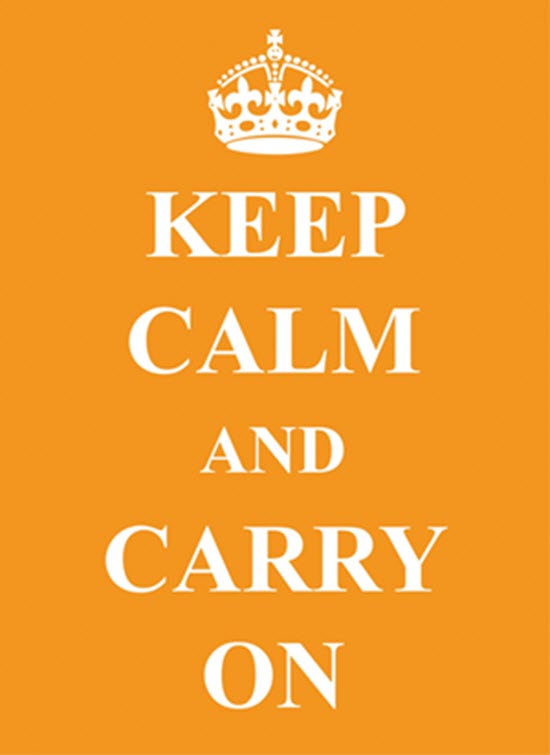Did you know that ‘Keep Calm and Carry On’ was a motivational poster produced by the British government in 1939 in preparation for World War II. The poster was intended to raise the morale of the British public, threatened with widely predicted mass air attacks on major cities.
Now that might be a reason to stress about. But in our lives today everything is becoming a stressor. Today I stood in a long line at the grocery store finding myself getting angry about the fact that there wasn’t another cashier. Really? The great thing however is that as soon as this thought popped in my head, my other, newly trained, reflex kicked in. I immediately question my thinking and reminded myself to ‘stay calm and carry on’.
Yes, there are situations in life that are worth pausing, feeling the pain, and honoring the significant impact that moment is having on your life. An example for me would be my divorce 10 years ago. You can’t roll pass those moments in life. Reflecting, recognizing the specific feelings (anger, sadness, fear, etc), and soothing yourself (or with the help of someone else) is critical. But even in these circumstances there comes a point where it’s time to move on and to continue life to the best of your ability.
If we are honest with ourselves we do stress a lot about things that in the bigger picture are not worth stressing about. Traffic, showing up somewhere too late, having too much on your plate, the laundry piling up, or standing in line at the store, the list goes on and on and on.
Want to know what happens in your body? Kicking in the stress hormone adrenaline your body picks up blood pressure, heart rate, and increases respiratory functions to get more oxygen. In short, it’s doing everything to get your body into fight-flight response. RUUUUUN!! Because you’re being chased by the tiger…or not? Your body doesn’t know the difference. And every time that happens your blood flows out towards your extremities, leaving the heart and digestion unsupported. Not good. Especially not if this is a chronic state.
Stress is estimated to be responsible for 80% of all doctors’ visits. And I believe that. The short list of physical symptoms includes being tired but wired, digestion issues, poor sleep, and accelerated aging. Mood issues up to depression, lack of impulse control, memory issues, and change in appetite are just a handful of examples of what stress does to you. But that’s not all…
Stress is at the core of this country’s top diseases that cause us to prematurely die – cardiovascular disease, depression and anxiety, eating disorders, and even Alzheimer’s and cancer. Don’t you think this is worth considering a few changes in your life? There are so, so many ways to reduce stress, but…
There is one technique that was the biggest game changer for me. The realization that I’m in full control (or can be) of how I react to any given situation. Said in another way, you need to choose optimism and seeing the good in the situation rather than choosing to be a victim of the circumstances. You move from angry or worried to staying calm.
I know that’s easier said that done but the first step is to realize that our subconscious is feeding us thoughts that aren’t in fact our thoughts. How often have you caught yourself thinking a horrible thought about something or someone and you immediately paused in shock embarrassed that you had such awful idea? I can remove your guilt.
For the most part our subconscious feeds us our thoughts based on the values and beliefs we’ve largely accumulated in the course of our first 7 years of life. You watching your parents (or any person of authority you spent meaningful time with) created an imprint of how you view the world today. Your role as a woman or a man in society or in a relationship, what circumstances should shock you, make you mad or sad, how to engage with other (‘superiors’, ‘inferiors’, strangers, etc). All of it is ingrained in your subconscious. There is a lot of solid research on this (see references).
So good news is, it’s not you. Well, not your conscious you. Having said that, you can train your conscious mind to be more powerful than your inner mean critic.
The first step is to recognize the bad chatter in your brain and to hit the pause button. This gives you a chance to objectively look at the situation. Then ask yourself “is this situation truly worth me getting upset?” Your inner critic will scream “YES!” But in the big picture and, knowing that your reaction will only negatively impact you, “is it truly worth me being unhappy?”. If the answer remains a ‘yes’, then maybe it’s time to change course and adjust your circumstances to not find yourself in this bad place over and over again.
You have a choice. The other day I was talking to someone who said he was super stressed about his to-dos at work piling up and barely being able to finish one project as all he could think of were the 3 other things that were due the next day. He can worry and be mad at his boss but, as you can tell, he not only creates a stressful chain reaction in his body, but he’s become unproductive. Nobody benefits from that.
It’s a muscle you’ll want to train.
All the time. Every time.
Here’s the thing though, all this becomes so much easier if you work a little bit on getting all the other things that make us healthier and happier better. Getting a good night sleep has huge impact on your patience the next day. Replacing sugary and processed foods with nutritious whole foods in your life will help your brain to think sharper and avoid symptoms of depression. And exercise helps bump up the production of your brain’s feel-good neurotransmitters, called endorphins.
I’ve experienced the difference between ‘going through the motions’ and feeling physically vibrant, focused, and joyful and I’d love for you to feel this good too. My team of amazing JOYVIAL health coaches is here to help. Are you ready to benefits from our support? Click here to start the conversation.


